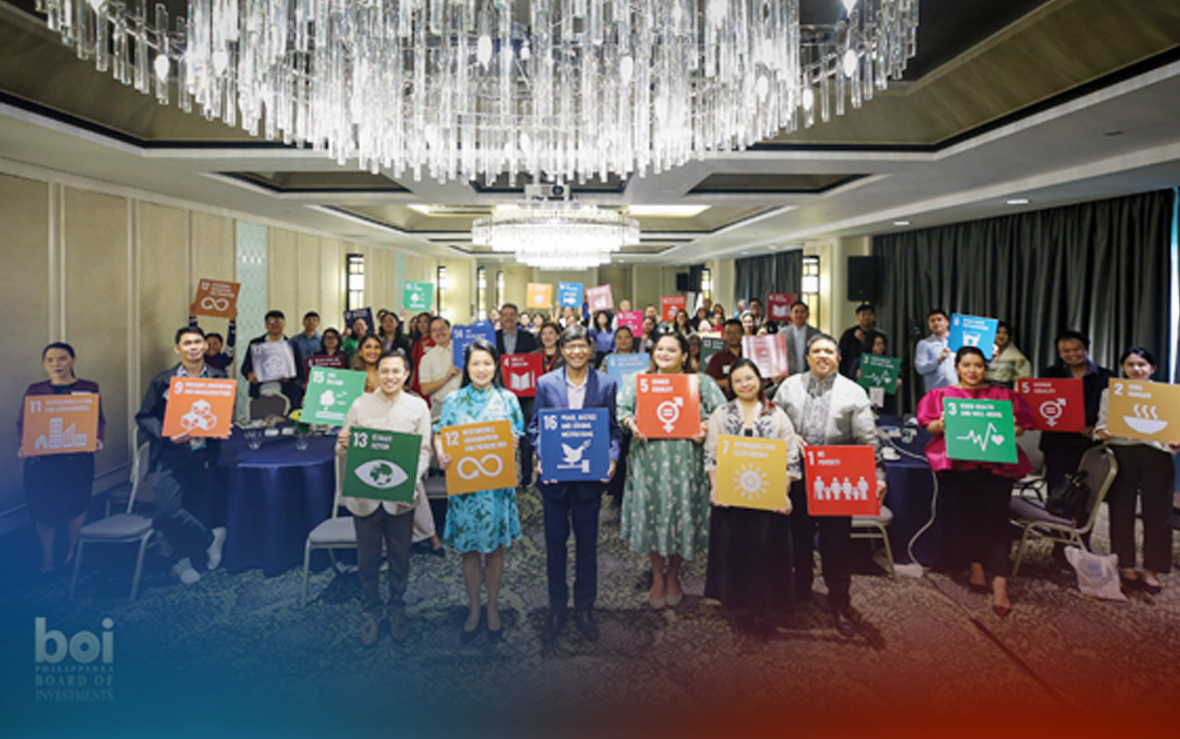Make Sustainability Happen in the Philippines. Participants actively engaged in sector deep dives to further explore and address key investment opportunity areas (IOAs). They also examined the opportunities outlined in the Policy White Space report, aligning with the investor map’s thematic sectors to boost climate action and SDG investments in the Philippines.
In photo (front) from L-R: Mr. Aljo Quintans, SDG Specialist, UNDP Philippines; Ms. Sue-Ann Huang, Director, Temasek Trust; Dr. Selva Ramachandran, Resident Representative, UNDP Philippines; Ms. Devahuti Choudhury, Senior Regional Specialist Private Finance for SDGs, UNDP; Dr. Rose Marie Mendoza, Chief for Energy Division, DTI-BOI; and Mr. Dino Recto, Research and Policy Division Chief, DTI-BOI.
Makati City, Philippines – Maintaining the momentum from the launch of the Philippine SDG Investor Map (link: https://www.undp.org/philippines/publications/philippine-sdg-investor-map), the United Nations Development Programme (UNDP) in the Philippines and the Philippine Board of Investments (BOI) tackled the Investment Opportunity Areas (IOAs) from the Map in a sector deep dive with key private sector stakeholders, investors, and development partners.
SDG Investor Maps (https://sdginvestorplatform.undp.org) are vital market intelligence tool that encourage the private sector to participate in the Global Goals and identify investment themes in emerging markets. The Philippine SDG Investor Map is envisioned to be a dynamic document that will reflect country opportunities for sustainable investment. It has identified twelve investment opportunity areas, including opportunities in the sectors of climate and health.
To further expand the first iteration of the Philippine SDG Investor Map, UNDP Philippines prepared a Policy White Space Report to provide information about promising investment opportunities that are currently in need of either more business-enabling government policies and regulations or a more reliable business model. The sector deep dive aimed to facilitate a dialogue to better understand the gaps and challenges and propose solutions in operationalizing and enabling SDG-focused investments in the Philippines.
In his message, UNDP Philippines Resident Representative Dr. Selva Ramachandran highlighted that the role of the private sector is huge and critical in the Philippines. “We understand the magnitude of the challenge in front of us, and we have a range of tools and solutions – many will be discussed in this forum. More urgently, we need to understand how we can move from solutions to action, and how we can drive collective action and make progress towards common goals to address climate change and achieve more equitable and inclusive development outcomes for all,” Dr. Ramachandran noted.
With support from the Centre for Impact Investing and Practices (CIIP), the sector deep dives focused on the IOAs on climate and health identified in the SDG Investor Map and Policy White Space report to boost climate and SDG investments in the Philippines.
The activity featured presentations on Country Initiatives on SDG Investments by BOI Chief for Research and Policy Division Dino Recto; Understanding Pathways for Flow of Investments to Catalyze the SDGs by UNDP Senior SDG Impact Specialist for Asia Pacific Ms. Devahuti Choudhury; and the Philippines SDG investor map by UNDP Philippines SDG Specialist Mr. Aljo Quintans. The event participants were also divided for focus group discussions for climate-linked IOAs on water and waste management, renewable energy, and agriculture, as well as health-aligned IOAs.
BOI Chief for Resource-Based Industries Service’s (RBIS) Energy Division Dr. Rose Marie Mendoza highlighted the importance of adapting to the rapidly evolving renewable energy ecosystem, “The renewable energy sector thrives on collaboration between the public and private sectors. With each new player comes more complexity—whether in technology, investment dynamics, or market strategies. As we solve today’s challenges, we inevitably encounter new issues, reflecting the natural cycle of climate innovation. That’s why a strong, focused approach to de-risking renewable energy investments is critical. Equitable financing options backed by supportive policies will enable both small and large players in the ecosystem to thrive and adapt to an ever-evolving landscape.”
Insights and reflections from these focus group discussions were presented by Villgro Philippines CEO Priya Thachadi and Philippine Board of Investments Research and Policy Division Chief Dino Recto. The discussion presented available opportunities that painted an optimistic picture of how private sector can substantially contribute to addressing financing gaps for SDG and climate-related investments.
In her message, CIIP Director Sue-Ann Huang shared that “Asia is still underrepresented in the impact investing space, and assets under management allocations remain insufficient in keeping pace with the growing needs and opportunities in the region. Only 15% of global impact investments are channelled to Asia, and only 3% to Southeast Asia. This is too low, especially since ASEAN is set to become the fourth largest economy globally. It was this belief that guided CIIP’s support of the development of the SDG Investor Maps for Southeast Asia. The maps help investors and businesses identify impact business models and investment opportunity areas that contribute towards the SDGs. Building from these findings, the SDG Venture Scaler will focus on supporting growth-stage enterprises in enhancing their capacity to attract impact financing.”
The event also introduced the recently-launched SDG Venture Scaler (link: https://impactventurehub.org/sdg-venture-scaler/), a new program to mobilize private investment for sustainable development in Southeast Asia. SDG Venture Scaler will focus on supporting growth-stage enterprises in Indonesia, the Philippines, and Vietnam, with particular emphasis on climate action, education, and health care, in line with the SDGs. The program, which will run through 2025, will select 30 ventures, providing them with tailored business advisory services, investment matchmaking opportunities, and robust Impact Measurement and Management (IMM) training to enhance their capacity to measure and articulate their social and environmental impact.
The event was attended by more than 50 representatives from key stakeholders involved in the development financing in the Philippines, including key government agencies, private sector organizations and networks, and non-government organizations.

